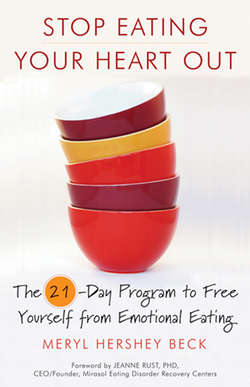Читать книгу Stop Eating Your Heart Out - Meryl Hershey Beck - Страница 11
На сайте Литреса книга снята с продажи.
Chapter 2 Becoming Self-Honest
ОглавлениеThe longest journey is the journey inward, for he who has chosen his destiny has started upon his quest for the source of his being.
—DAG HAMMARSKJÖLD, MARKINGS
AS OLIVER HARDY MIGHT HAVE said to his sidekick, Stan Laurel, “This is a fine mess we've gotten ourselves into.” No, they weren't referring to weight, but we certainly can apply that to us!
Emotional eating, binge eating, compulsive overeating—whatever we want to call it, the actions and results are similar: out-of-control eating often resulting in overweight or obesity. For our purposes here, the words binge eater, compulsive overeater, and emotional eater will be used interchangeably, as they are all meant to imply the same thing—using food to satisfy our emotional needs.
Emotional overeating involves eating large quantities of food in a short period of time, feeling out of control during these binges, eating rapidly, eating without physical hunger, choosing to eat alone, grazing (nibbling at food all day), and/or feeling depressed about overeating.
What caused us to become compulsive overeaters? Many of us grew up in homes where we lived with anxiety and found comfort in food. Many of us grew up with criticism and shame and found an escape in food. Many of us grew up believing we were imperfect and needed to hide that feeling of imperfection by stuffing our faces (or, in reality, our bellies). Here is a list that describes some of us. As you read through it, count how many apply to you all or much of the time:
I am preoccupied with food, eating, and weight.
I am aware that my eating patterns are not normal.
I eat when I am not physically hungry.
I eat very little in public and binge in private.
I eat to comfort myself and relieve distressing feelings.
I tend to eat more when I am stressed, anxious, or depressed.
I graze all day, often needing something in my mouth.
Food has become my friend, my lover, or my drug of choice.
I sometimes feel hungry even after a large meal.
I eat more rapidly than other people.
I allow the scale to determine if I have a good or bad day.
I eat until my stomach hurts or I feel nauseated.
I feel ashamed of myself due to the quantity of food I consume.
I feel powerless over my eating behavior.
I eat before I go to bed at night so I can sleep.
I use food as a reward.
I eat when I am bored, tired, or feeling blah.
I eat when I see food ads on TV.
I often stop to get fast food and eat it in the car.
I am secretive about what I eat and how much I eat.
I eagerly anticipate the times I can eat alone.
I am an overachiever and want to be in control.
I often think I am worthless or not good enough.
I frequently compare my body size to that of others.
I make derogatory jokes about my eating or body size.
I have tried many diets, unsuccessfully.
I am terrified that I will keep gaining weight.
Going through the list helps you become conscious of some of your patterns around food and weight issues. If you recognize yourself in three or more, you are probably a compulsive overeater. Congratulate yourself for your truthfulness. We cannot change that which is hidden; bringing all this up and out is necessary in the process of healing and self-growth.
You might not have thought about food as a drug, but think about how you use it. Addicts and alcoholics use their drugs/alcohol to anesthetize themselves. Is that what you are doing with food? Addicts and alcoholics use their drug of choice as a mood-altering substance to escape from emotional pain. What do you use to escape your feelings? Food, right? This is not about making you feel wrong or bad. It is about shedding light on the activity you desire to change—your compulsive eating. It is about coming out of hiding and admitting to yourself that you use food just as alcoholics use booze. It is about admitting to yourself that you need your food fix just like dope addicts need their drug fix.
Take a deep breath—this may be a lot to take in. Again, being food dependent does not mean you're bad. You have a dependency, and as you read on and do the assignments, you will acquire tools to lessen the need to use and abuse food.
